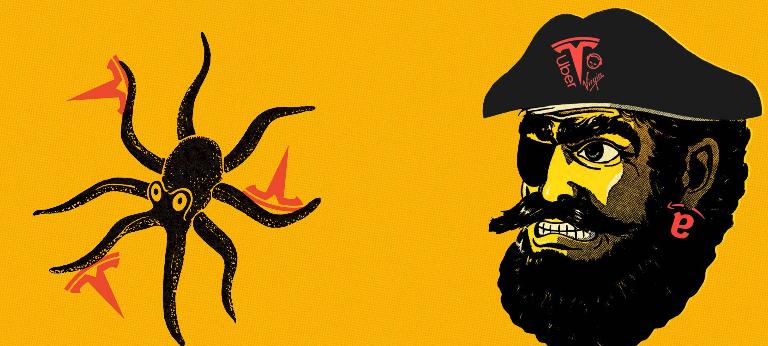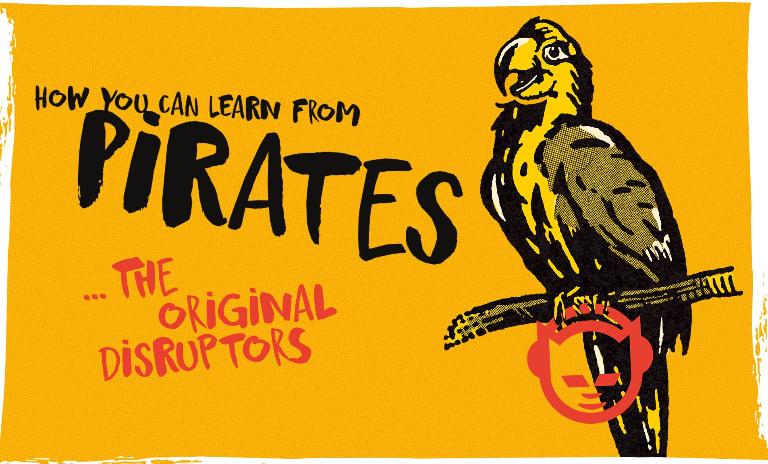Breaking the rules
![{[downloads[language].preview]}](https://www.rolandberger.com/publications/publication_image/Think_Act_Magazine_Breaking_the_rules_Cover_download_preview.jpg)
Is breaking the rules a crucial skill? We examine how the people who have made their own rules also significantly shaped the world of business.



From organizational agility to fostering active team engagement, those salty buccaneers may have more to teach us digital-age landlubbers than we thought.
The most successful figure of the Golden Age of Piracy did not care for it much at first. Born in Wales in 1682, Bartholomew "Black Bart" Roberts was the second mate on board the slave ship Princess when it was captured by pirates in 1719 and he was forced to join the crew. Six weeks later, the captain was killed and Roberts was elected chief. Until his death during an altercation with a British warship off the coast of Africa three years later, Roberts traveled from Newfoundland to Brazil, capturing over 400 vessels – by far the most of any pirate captain of his time.
There is something about Roberts' legacy, and pirates in general, that speaks to today's entrepreneurs. Pirate flags decorate the offices of startups in Silicon Valley. Originally said to the Macintosh team by Steve Jobs in 1982, "it's better to be a pirate than to join the navy" is now a famous maxim. Facebook founder Mark Zuckerberg's motto, "move fast and break things," has a similarly pirate-like spirit. A number of recent business books examine pirates as quasi role models more explicitly. "Pirates went head-to-head with the world's mightiest military forces, the enormous resources of the first state-backed multinational corporations and the combined strength of the global superpowers of the day," writes Sam Conniff Allende in 'Be More Pirate: Or How to Take on the World and Win'. "And for nearly 40 years, they won." Pirates, in other words, were the original disruptors.

There is no shying away from the fact that pirates were thieves, and often murderous. They stand apart from other criminals, however, because of their organizational and social innovations. Sailors were drawn to the pirate movement of the 17th century as a means to escape the dehumanizing work of the navy or merchant shipping; according to Conniff Allende, they were a generation that felt "excluded from their own future." Aboard their ships, pirates introduced a fair ratio of pay among crew members and gave everyone a vote, even women (of which there were a few) and non-whites (of which there were many). Roberts asserted in the first article of his 1722 pirate code: "Every man has a vote in affairs of the moment; has equal title to the fresh provisions, or strong liquors, at any time seized, and may use them at pleasure unless a scarcity makes it necessary, for the good of all, to vote a retrenchment."
Enlightened as it may seem, this approach was not to address the gaping social inequality of the time, says Peter Leeson, author of The Invisible Hook: The Hidden Economics of Pirates. "You can steal a purse by yourself, but you can't overwhelm a merchant ship without the help of others," he points out. Pirates' organizational problem of maximizing profit was also a problem of governing to promote cooperation and prevent conflict. This is why, at a time when the world was organized autocratically, pirates formed democracies. As Leeson says. "They did it because democratic ship organization was profit-maximizing." Devotion to maximizing profit, he adds, is "essential for entrepreneurs who want enormous success."
Pirates were also quick to adapt to regulatory changes. When governments started to crack down on piracy, pirates pretended that they were coercing new members to join, even advertising the fact in port newspapers. That way, if a new recruit was captured he could testify that he had been forced to become a pirate. "Being more pirate isn't about flouting the law," says Andrew Wolfin, a partner in the corporate department at Mishcon de Reya. "Pirates challenged authority. The spirit of piracy is probably not a million miles off the spirit of punk. It's the healthy disregard that I think business owners, and particularly entrepreneurs, are exhibiting but also need to exhibit in today's market."
"Being more pirate isn't about flouting the law."
When the East India Company attempted to trademark their routes in the 17th century, they were challenged by pirate ships, leading to the creation of "international waters." Start-ups must also find a way to navigate the ever-changing regulatory environment, according to Wolfin. "The fun bit of working with young businesses and entrepreneurs is helping them to work within the increasingly restricted business landscape to maximize their potential for innovation," he says. "With huge corporations or institutions, it's inevitably harder to be flexible or to pivot quickly, not least given that decisions often need to be run past committees and stakeholders."
It was this kind of experience working in large corporations that compelled the founders of Fount, a US-based digital product design and development studio, to think radically. Determining that they wanted to build a business that was not only profitable, but also fair and sustainable, the partners studied the pirate codes of the 18th century and found that entire crews were involved in the making of significant decisions. Leaders at Fount are not appointed from above. Instead, project "crews" anonymously elect a "captain," ensuring that the project leader has the full faith and confidence of the team.
Pirate captains knew they needed to be transparent about pay – inequalities would lead to jealousy, lack of trust and an unwillingness to collaborate. Aboard Black Bart's ships, the captain and quartermaster got two shares of a prize; the master, boatswain and gunner got one share and a half, and the other officers one and a quarter. At Fount, ownership is directly proportional to active involvement in the organization, explains Founding Partner Ryan VanMiddlesworth. Every quarter, a set number of new shares are issued and these shares are distributed evenly among employees, meaning that the newest Fount "crew member" and the original founders accrue ownership at the same rate. "This was a critical realization for us," he says. "When you give everyone a non-trivial stake of ownership and a vote in the corporate decision-making, people are much more invested, emotionally and financially, in the strategy and success of the company."

![{[downloads[language].preview]}](https://www.rolandberger.com/publications/publication_image/Think_Act_Magazine_Breaking_the_rules_Cover_download_preview.jpg)
Is breaking the rules a crucial skill? We examine how the people who have made their own rules also significantly shaped the world of business.
Curious about the contents of our newest Think:Act magazine? Receive your very own copy by signing up now! Subscribe here to receive our Think:Act magazine and the latest news from Roland Berger.
